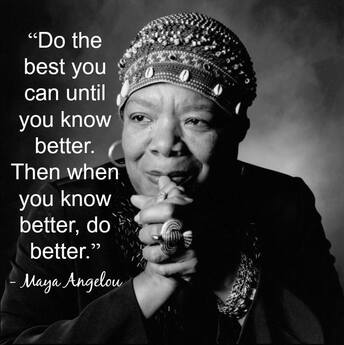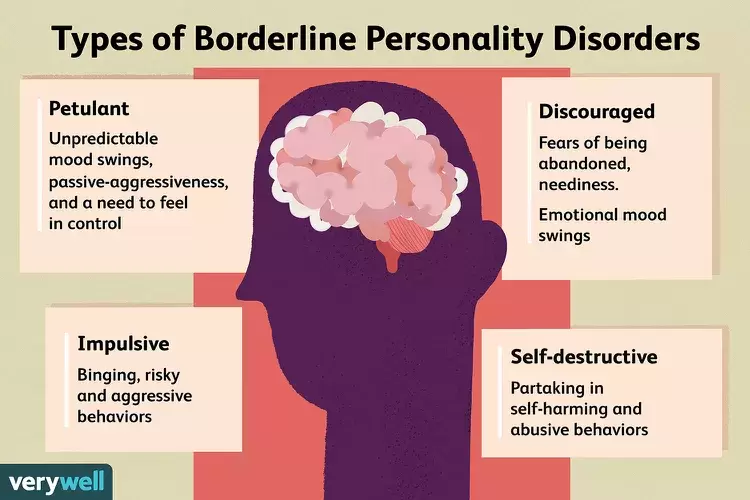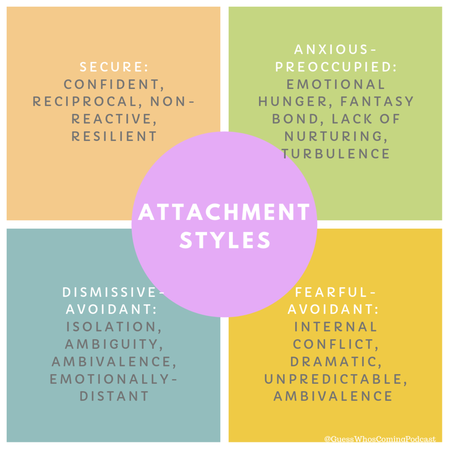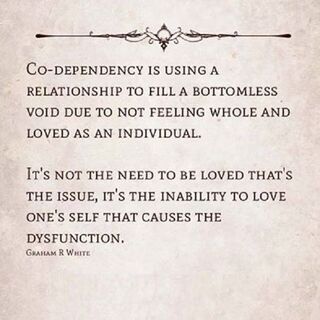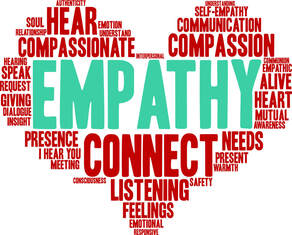ResourcesAfter listening to over 1,000 hours of videos that focus on self improvement and relationship recovery, I have created links to some of the most helpful videos, websites, and books I have come across during my journey. I'm also including direct links to some of my favorite online coaches and support sites. If you have more to share, please send me a link on the contact page. With all of this information, be careful as to not get overwhelmed.
Within our resource pages, along with a brief description of the medical diagnosis and personality traits below, this site focuses on: Childhood Trauma and Attachment Styles, Codependency Recovery, Complex-PTSD, Empaths and Codependents, Healthy Relationships, Mindfulness and Meditation, Toxic Childhood Relationships, Toxic Romantic Relationships, Self-Esteem and Healing, and a new page dedicated to my recent relationship experience with someone with Borderline Personality Disorder. |
NEW: Click here for research on Borderline Personality Disorder relationship recovery!
|
Advisors Researched (*stand outs)
Support Systems
Support groups are offered by each of the coaches above on FaceBook. Below are additional support groups to help you rise above.
New Section: Borderline Personality DisorderWhat is borderline personality disorder?
Borderline personality disorder is a mental illness that severely impacts a person’s ability to manage their emotions. This loss of emotional control can increase impulsivity, affect how a person feels about themselves, and negatively impact their relationships with others. Effective treatments are available that can help people manage the symptoms of borderline personality disorder (NIMH). Click here for more details. |
Childhood / Complex PTSD
|
In a research paper published by Dr. Bessel A. van der Kolk, M.D. (Professor of psychiatry, Boston University Medical School, Clinical Director of The Trauma Center at Justice Resource Institute, and Co-Director, the National Child Traumatic Stress Network Community Program, Boston), childhood trauma, including abuse and neglect, is probably the single most important public health challenge in the United States. The traumatic stress field has adopted the term “complex trauma” to describe the experience of multiple, chronic and prolonged, developmentally adverse traumatic events, most often of an interpersonal nature and early-life onset. These exposures often occur within the child's care-giving system and include physical, emotional, and educational neglect and child maltreatment beginning in early childhood.
|
What symptoms are seen in Complex PTSD?
An individual who experienced a prolonged period (months to years) of chronic victimization and total control by another may also experience the following difficulties:
An individual who experienced a prolonged period (months to years) of chronic victimization and total control by another may also experience the following difficulties:
- Emotional Regulation. May include persistent sadness, suicidal thoughts, explosive anger, or inhibited anger.
- Consciousness. Includes forgetting traumatic events, reliving traumatic events, or having episodes in which one feels detached from one's mental processes or body (dissociation).
- Self-Perception. May include helplessness, shame, guilt, stigma, and a sense of being completely different from other human beings.
- Distorted Perceptions of the Perpetrator. Examples include attributing total power to the perpetrator, becoming preoccupied with the relationship to the perpetrator, or preoccupied with revenge.
- Relations with Others. Examples include isolation, distrust, or a repeated search for a rescuer.
- One's System of Meanings. May include a loss of sustaining faith or a sense of hopelessness and despair.
Attachment Styles
|
According to Lisa Firestone, Ph.D. in the article How Your Attachment Style Impacts Your Relationship, our style of attachment affects everything from our partner selection to how well our relationships progress to, sadly, how they end. That is why recognizing our attachment pattern can help us understand our strengths and vulnerabilities in a relationship. An attachment pattern is established in early childhood attachments and continues to function as a working model for relationships in adulthood.
Childhood is a critical time for discovering and enhancing the secure attachment ideally built in the early years of a parental relationship with a child. Our earliest relationships do a great deal to establish our sense of self and well-being. Knowing, “I matter, my needs matter, and my loved ones will help keep me safe” affirms a child’s sense of self-worth. |
Codependency
|
As stated in Mental Health America, co-dependency is a learned behavior that can be passed down from one generation to another. It is an emotional and behavioral condition that affects an individual’s ability to have a healthy, mutually satisfying relationship. It is also known as “relationship addiction” because people with codependency often form or maintain relationships that are one-sided, emotionally destructive and/or abusive. The disorder was first identified about ten years ago as the result of years of studying interpersonal relationships in families of alcoholics. Co-dependent behavior is learned by watching and imitating other family members who display this type of behavior.
|
Empaths
|
According to Judith Orloff, M.D., the trademark of an empath is that they feel and absorb other people’s emotions and/or physical symptoms because of their high sensitivities. They filter the world through their intuition and have a difficult time intellectualizing their feelings. When overwhelmed with the impact of stressful emotions, empaths can have panic attacks, depression, chronic fatigue, food, sex and drug binges, and many physical symptoms that defy traditional medical diagnosis.
|
Narcissistic Personality Disorder
|
Narcissistic personality disorder (NPD) is a cluster B personality disorder defined as comprising a pervasive pattern of grandiosity (in fantasy or behavior), a constant need for admiration, and a lack of empathy.
Signs and Symptoms In the American Psychiatric Association’s Diagnostic and Statistical Manual of Mental Disorders, Fifth Edition (DSM-5), NPD is defined as comprising a pervasive pattern of grandiosity (in fantasy or behavior), a constant need for admiration, and a lack of empathy, beginning by early adulthood and present in a variety of contexts, as indicated by the presence of at least 5 of the following 9 criteria: |
- A grandiose sense of self-importance
- A preoccupation with fantasies of unlimited success, power, brilliance, beauty, or ideal love
- A belief that he or she is special and unique and can only be understood by, or should associate with, other special or high-status people or institutions
- A need for excessive admiration
- A sense of entitlement
- Interpersonally exploitive behavior
- A lack of empathy
- Envy of others or a belief that others are envious of him or her
- A demonstration of arrogant and haughty behaviors or attitudes
Covert Narcissism
In an excerpt taken from Psychology Today, although not officially recognized (yet) by the APA, not all narcissists are openly grandiose and outwardly intrusive. Various researchers and authors have written about the introverted narcissist, variously identified as the covert narcissist, the hypersensitive narcissist, the closet narcissist, and the vulnerable narcissist. This sub-type of narcissism is more hidden, and yet can carry the same self-conceit and negative contagion as their extroverted counterpart.
What both extrovert and introvert narcissists have in common is their employment of an outer veneer of superiority, to disguise their inner sense of vulnerability and extremely low self-esteem. While the extroverted narcissist will say, in so many ways, that “I’m better than you”, the introverted narcissist will strongly hint at it. Tell tale signs to help you recognize a covert narcissist:
What both extrovert and introvert narcissists have in common is their employment of an outer veneer of superiority, to disguise their inner sense of vulnerability and extremely low self-esteem. While the extroverted narcissist will say, in so many ways, that “I’m better than you”, the introverted narcissist will strongly hint at it. Tell tale signs to help you recognize a covert narcissist:
- Stubborn, rarely apologizing unless they want something from you (see narcissistic supply)
- Emptiness, seems to have something missing that you can't quite put your finger on
- Very sensitive to constructive criticism and will often punish you by "ghosting" you
- Expert liars, superficially charming, hypnotic, a master of manipulation
- Ability to make you feel guilty, even when something is not your fault
- Entirely self centered; they are the center of their own universe
- Projecting their insecurities and defects onto you
- Inability to form intimate relationships
- Inability to feel genuine remorse
- Blaming others for their Problems
- Low emotional intelligence (EQ)
- EXTREME lack of empathy
- Highly materialistic
- A victim mentality
- Cowardly
